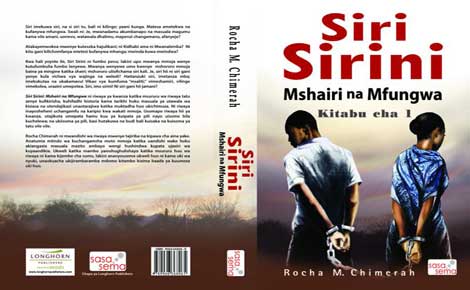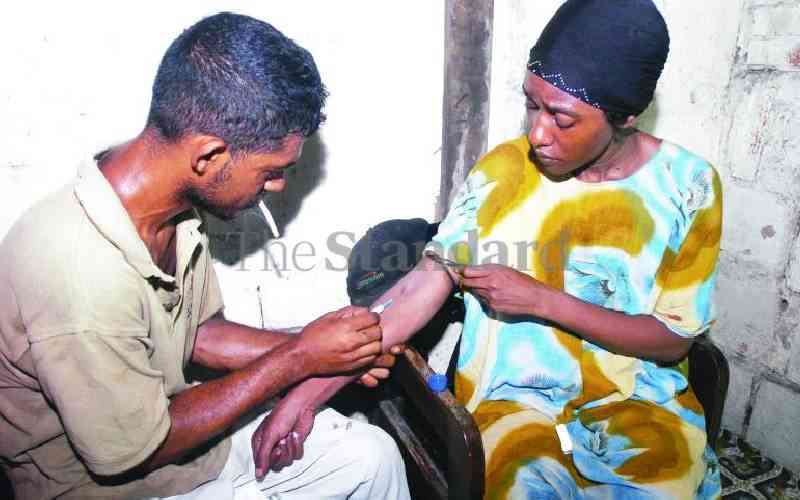In his book, Aspects of the Novel, Edward Morgan Forster has outlined the basic characteristics of the novel as a genre. Forster, for example, states that a novel should have not less than 120,000 words or 403 pages.
Most African novels, particularly those written in Kiswahili, may not meet Morgan’s criteria for the simple reason that the tradition of writing and reading in Africa is arguably not so much established as compared to that of the West.
However, since the 90s, Kiswahili literature has witnessed a surge of relatively longer novels, a development that can be attributed to the realisation by some publishers that creative works do have a market after all.
It is in this spirit that Longhorn Publishers has released probably the longest Kiswahili novel — Siri Sirini (Secret within A Secret) by Rocha Mzungu Chimerah.
Siri Sirini is a trilogy in which Chimera incorporates oral history to delve into the the past, the present and even foretell the future.
He uses the kernels of the Swahili cultural hero and legend Fumo Liyongo, Mwana Kupona Binti Mshamu, a Swahili poetesses, to weave a powerful story that is captivating and entertaining.
The trilogy consists of Siri Sirini1: Mshairi na Mfungwa (458 pages), Siri Sirini 2: Mpiga Mbizi Kilindini(322 pages) and Siri Sirini 3: Mtihani wa Mwanamke(423 pages).
FAMOUS SWAHILI LEGEND
The story starts with a trial of a man referred only to as a “prisoner.” A group of people has come to witness the event in which the “prisoner”, a huge man, quite docile, is brought before a judge and a jury of six elders.
The charges levelled against the accused include treason, incitement and seeking self-glorification.
People in the court react angrily and are arrested haphazardly. The evidence that is adduced in court to drum up the charges is found in his poem, a takhmisa (a quizaine redaction).
The prosecution is all out to prove that the verses in the said work contain information amounts to treason. Eventually the jury — which in essence is a kangaroo court — declares that he is guilty as charged and therefore he is sentenced to a hard life in jail.
The verdict does not augur well with the crowd within the precincts of the court. There is uproar in court and the police are forced to surround the jury and the judge to protect them from the fury of the masses.
As the story progresses, the reader will realise that this is actually the trial of Fumoloti Liyongo. Fumoloti, as depicted by Chimera Liyongo, is quite similar in character to the Fumo Liyongo, the famous Swahili legend. He is a cousin to the reigning king, a celebrated general well-loved by the people.
The Swahili community, in which the story is set, was matrilineal before the coming of Islam. The king, Daudi Mringwari, sees Liyongo as threat to his reign. Through this kind of kinship ties, the writer shows how nepotism is rife is amongst most post-independence African leaders where the ruling class is a maze of family relations.
Stay informed. Subscribe to our newsletter
The king, Daudi Mringwari, is Liyongo’s maternal cousin. Liyongo’s mother, Mwanaziza, had two siblings; a brother and a sister. The sister, who is deceased, is the mother of the Chief Kadhi, Sheikh Zahid Majid Mngumi.
The brother, Fumo Malik Mringwari, was the father to the current king as well as Princess Mwanamalemba who is married to her cousin, her mother’s nephew. Mwanamalemba’s husband, Abubakar Shahamey Makame is the Prime Minister. Mwanalemba, who is an ardent supporter of Liyongo, pens a poem Siri Sirini which exposes the of the ills of her brother, the king.
Liyongo’s father, Bauri was a business man from Arabia but who originally came from Malindi. As a result, Liyongo’s detractors keep using the Arabian connection to claim he’s of foreign descent — just the same way this kind of racist card was used against Barack Obama to prevent him from ascending to America’s presidency.
It does not help an inch despite the fact that his wife Zahra Al-Amin Khitamy is an Arab. Liyongo manages to escape from jail during his daughter Mwanakupona’s wedding.
Mwanakupona, an upcoming poet, has written a poem which raises the kingdom’s temperatures. It basically advises a daughter on how to live with her husband in peace and according to the teachings of Islam. The conservative group surrounding the monarch wants the poem banned under the guise that will poison the minds of the youth, just because of a single verse in it!
After his daring escape from prison, Liyongo goes to live among the Galla, enemies of the Shanga. While in exile, he falls in love with and marries a Galla princess, Abanoye, as a second wife. He adopts her two children, Mwinyi and Mize. He trains Abanoye who becomes well-versed in various fighting techniques that later come in handy during the liberation of Shanga.
Liyongo’s detractors still want to finish him. The queen, Mwanalibasi, plans together with Kidhabi to assassinate him but the plain fails. Kidhabi is notoriously famous as an assassin. He is rumoured to have murdered Khalfan Muyaka, a Liyongo protégé, a former Minister of Justice whose clamour for change apparently signed his death warrant.
He is also thought to be behind the assassination of the Minister for Foreign Affairs, Mfawidhi Kijumwa Mfaume, after he led a government delegation on a successful visit to Egypt where he had received accolades. The scene where his body was discovered as well as the state of the half-burnt body is reminiscent of some of the unsolved assassinations in Kenya’s history.
POLITICAL ASSASSINATIONS
Liyongo’s murder sparks off an uprising which is conveniently blamed on Kibwana Mwengo Bashee, another devoted Liyongo supporter. He is exiled to Gallaland and subsequently informs Abanoye of Liyongo’s demise. Under Liyongo’s tutelage, Abanoye had gained the necessary skills to lead the Galla battalion to topple Mringwari’s rule.
In the ensuing melee, Kidhabi murders the prince, Suleiman Mringwari, and then disappears. The king and queen are captured though not harmed. Abanoye hands over the palace to Kibwana and leaves to allow the people of Shanga to deliberate on their future and destiny.
Chimerah has focused on diverse themes such as the (political) assassinations abound in our continent and despite investigations, they remain unsolved because the powers that be lack the will to have them solved. Three people have been assassinated in Shanga. They have been sanctioned by the king or his cronies. The crimes will never be solved because justice is elusive and is served according the whims of those in power. The master assassin in Chimera’s novels, Kidhabi disappears during the liberation and who knows, he might strike again in future.
EPIC GENRE
Prof Rocha Chimerah, currently teaching Kiswahili at Pwani University, has made history by writing arguably the longest Kiswahili novel. More interesting in this trilogy is the fact that he has deconstructed the Kiswahili epic genre which is “dying” and given it another lease of life.
The three books will no doubt be an interesting read for literary enthusiasts.
-Enock Matundura teaches Kiswahili literature at Chuka University and Rachel Maina teaches Swahili literature at Mount Kenya University.
 The Standard Group Plc is a
multi-media organization with investments in media platforms spanning newspaper
print operations, television, radio broadcasting, digital and online services. The
Standard Group is recognized as a leading multi-media house in Kenya with a key
influence in matters of national and international interest.
The Standard Group Plc is a
multi-media organization with investments in media platforms spanning newspaper
print operations, television, radio broadcasting, digital and online services. The
Standard Group is recognized as a leading multi-media house in Kenya with a key
influence in matters of national and international interest.
 The Standard Group Plc is a
multi-media organization with investments in media platforms spanning newspaper
print operations, television, radio broadcasting, digital and online services. The
Standard Group is recognized as a leading multi-media house in Kenya with a key
influence in matters of national and international interest.
The Standard Group Plc is a
multi-media organization with investments in media platforms spanning newspaper
print operations, television, radio broadcasting, digital and online services. The
Standard Group is recognized as a leading multi-media house in Kenya with a key
influence in matters of national and international interest.






